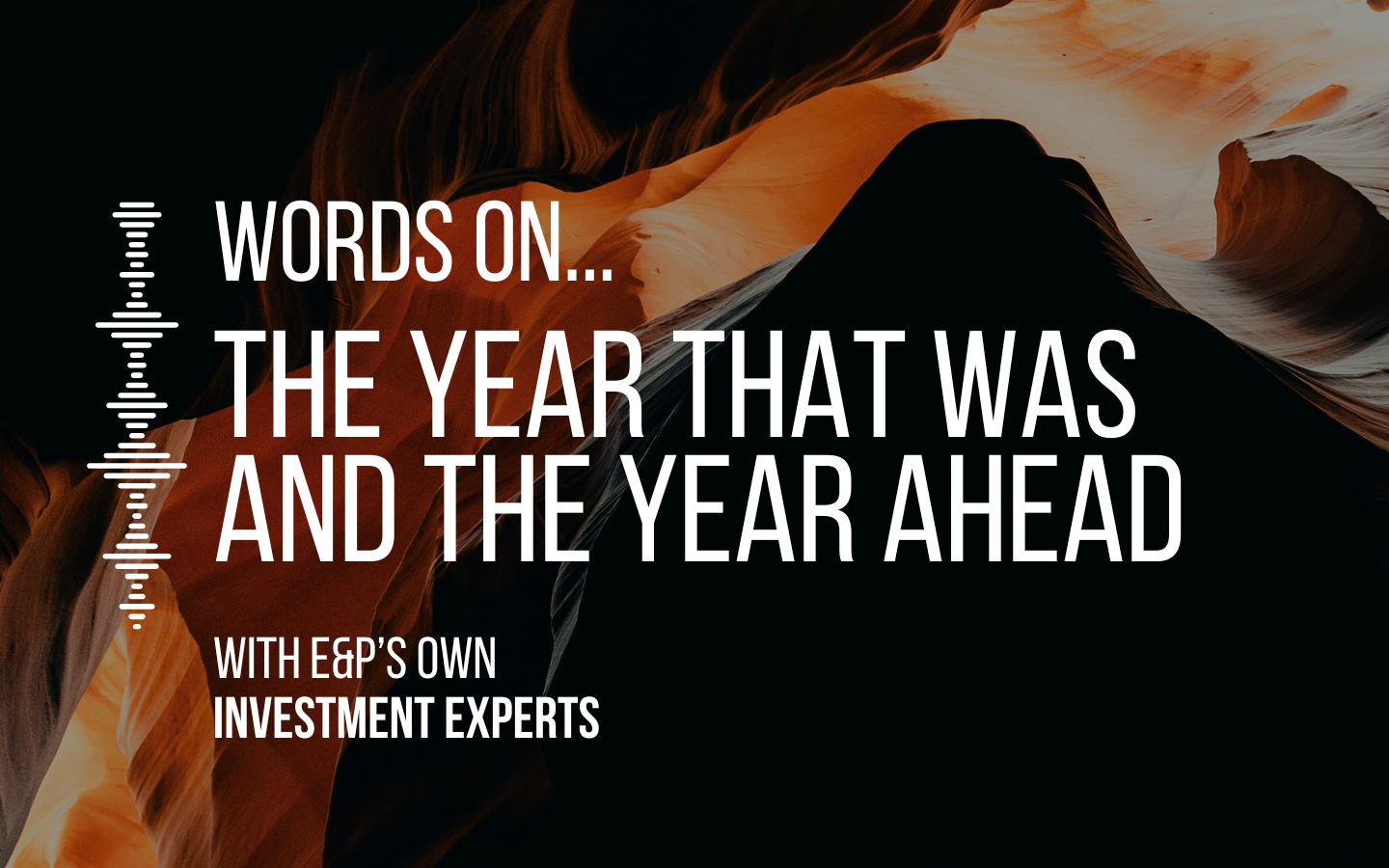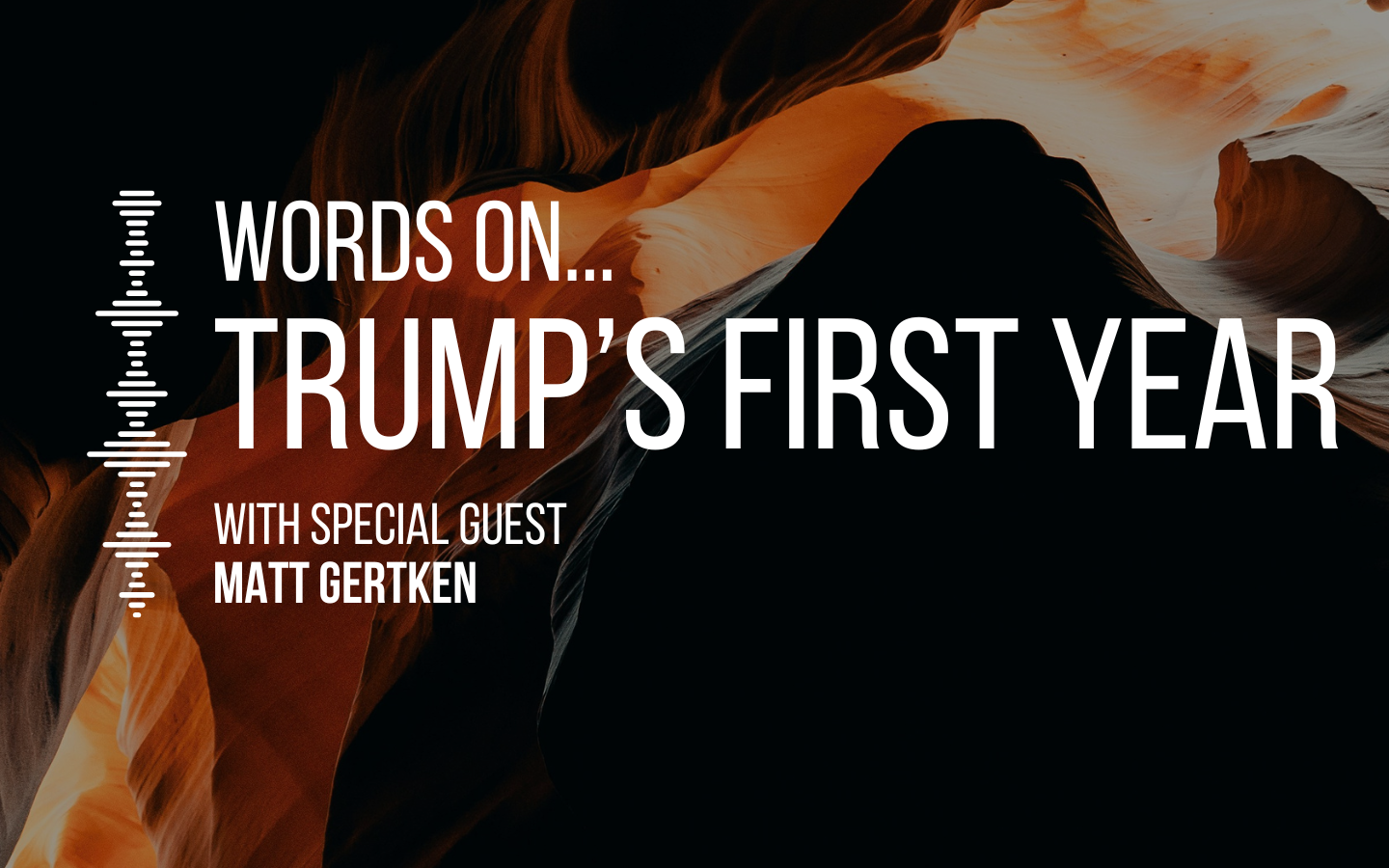


This week, CIO Tim Rocks welcomes back Gerard Minack from Minack Advisors to chat through what’s really going on in global markets. They question whether investors are getting too comfortable with rising trade tensions, consider if a recession is still on the cards, and unpack what’s driving the latest equity rally. They also dive into the AI boom, Europe’s surprising comeback, and how big investors are viewing the US dollar. Tune in to find out more.
This episode is also available on Apple Podcast.
Tim Rocks
Hello, welcome to Words on Wealth. I’m Tim Rocks, Chief Investment Officer at Evans & Partners. Today I have with me one of our regular correspondents, Manack from Manack Advisors. Jared has been actually overseas talking to some international investors. So we’ll be interested in that perspective. But as always, we’ll start with a bit of a rundown on what is going on globally, specifically the US. but I for one have certainly very confused about what has been going on and what might occur over the next year. But anyway, welcome Gerard and thanks again for your time.
Gerard Minack
You’re welcome. Thanks for having me.
Tim Rocks
So as my pre-leader suggested, let’s start with the US. What do you think’s going on? Are we still on track for a major downturn, recession? What’s your call?
Gerard Minack
Well, I certainly think markets are too complacent. I mean, we saw the shock of the Liberation Day tariff announcements and markets dived as you would have expected if you had known how severe those tariffs were going to be. But then as Mr. Trump has pulled back and delayed those tariffs, we had a rally. We’ve now got markets above where they were before Liberation Day was announced. And yet we’re facing the steepest increase in tariffs in the post-war period. I think markets are far too complacent to what shock that means. I mean, one of the reasons they’ll been lulled into this, I think, false complacency is that the so-called hard data, so the actual on the ground data as opposed to the sentiment data have been surprising to the high side up until very recently. In other words, the market’s been lulled into a false sense of security because it’s been delays between those tariff announcements and the impacts coming through. We’re getting the hint right now that the tariffs are starting to bite. We had a CPI report this week where segments that are most affected by tariffs started to rise. I think we’re going to start to see softer investment spending because not only we’re dealing with high tariffs, we’re dealing with high tariff uncertainty. And that’s a real chilling factor for CapEx. And we’re also seeing population growth set to slow because of the migration crackdown. And if you think about what trend or potential GDP growth is, it’s simply a function of productivity and population. And if you slow your population growth down, then you’re going to see growth slow. So it’s my absolute conviction that we’re going to see slower growth in the second half of the year. We can talk about whether it slows into a recession in a moment, but best case is a slowdown we’re going to see at least a temporary rise in inflation. All that’s going to amount to a Fed that’s going to be reluctant to ease. This is not a great mix for equities that are now at new all-time highs globally and almost there in the US. And valuations look very rich, particularly ironically for the rest of the market outside the MAG7, which has got their prospective PE almost back at cycle highs. So my base case is we are looking at the likelihood of a decent correction in the second half of the year. And that’s on the basis of a slowdown. There is.
Tim Rocks
So let’s dig into how big a slowdown you think it would be. ⁓ I think consensus is, initially after the tariffs was talking of growth, not more than about 1 % for GDP growth. Is that where you are or which side of that are you?
Gerard Minack
Yeah, no, that seems about right with the risks around that number skewed to the downside. My problem is I don’t think the equity market really is operating ⁓ on the basis that that’s the slowdown we’re going to see. The equity market and equity analysts are expecting pretty robust DPS growth heading into next year. That’s not really consistent with the GDP slowdown that the economic consensus ⁓ is forecasting. So I think there’s a real mismatch now between what the equity market’s pricing on the one hand and what the economic consensus is talking about on the other.
Tim Rocks
And so do you think that the equity market has just, I don’t know, got a bit impatient when it didn’t see an aggressive slowdown immediately, just automatically assumed that it wouldn’t happen, and now they’re going to be surprised when it actually does occur?
Gerard Minack
That and I mean, the irony that every back down by Mr. Trump saw the market pop, which you can understand the instant reaction to that sort of good news, but it’s gone way too far. I as I said, we’ve had so much backdowns that the markets above where it was on Liberation Day, but Mr. Trump has not backed down to pre-Liberation Day tariffs. He’s going to be imposing, and we’re already seeing it in the data, by the way, the steepest highest tariff barriers in the US in the post-war period. So it’s the market overreacting to the incremental good news and losing sight of the big picture that we have seen something bad happen in net terms on the tariff front. The other thing I just think about the equity market is yet again, ⁓ the dip buyers have been vindicated. And this is almost becoming now a Pavlovian reaction. A number of my clients have highlighted the parallel between what we’ve seen this year and what we saw in the pandemic. The pandemic saw a bear market almost unfold overnight. It did a super V shape and within a few months had recouped all its losses. Well, guess what? That template has played out again. And that’s just giving the natural bulls in the market and also the passive flows ⁓ courage to keep on buying. Now I think that courage at the moment is misplaced because what we’ve discussed. We’re going to see a growth slowdown, we’re going to see high inflation, you’re not going to get a lot of interest rate relief and there is a tail risk that you get a recession and in a recession money back guarantee you will get a bear market sell-off.
Tim Rocks
Yeah. And so if we’re looking to track whether that the the scale that downturn and whether we do head towards the R word, what parts of the economy are you most focused on? Is it the consumer side, investment side? What are we tracking to see whether that view is is right?
Gerard Minack
I’m focused on the labour market. It’s almost certain that we get an employment slowdown ⁓ and we almost need an employment slowdown because the supply of labour is itself slowing. And so that’s not threatening. But if it tips over into job losses, then that’s when you start to talk about a recession becoming a base case. Now, the lead indicators of whether that happens, ⁓ unfortunately, don’t give a very long lead. mean, they typically give you flash warning signs just two or three months before you actually tip into job losses. So what are those lead indicators? This is hiring intentions from the monthly business surveys, it’s job layoff announcements, which there’s a couple of surveys that report that, these sort of things. So what I’m saying to people is, look, you’ve got to be very nimble on this recession call. My base case at the moment is a soft landing. That’s not going to be great for equities, but still it’s not as bad as a recession. But it would only take one, two months of sharp deterioration in these leading indicators of employment that I’ll flip, I’ll flip quick and say you now need to brace for a hard landing. And that would change a number of my calls. It would firstly mean the Fed would ease more aggressively than what the market’s now pricing. You’ve never seen the Fed ease by less than 2%, 200 basis points in a recession the equity market always falls, no exceptions in a recession. The average decline is close to 30%. So a much more severe downturn for equities than I would have under the soft landing scenario. ⁓ And then we get the growth setback. Let’s see how deep it will be. ⁓ It’s too early to sort of make a judgment call on that. ⁓ There are some risks in the system around non-bank credit provision that could deepen the downturn, but let’s hold our horses. We’re not in the recession camp yet, but that is an extreme left-tail risk, but it would all change all my calls if those labour market indicators slipped ⁓ into the stage where they’re warning of outright job losses.
Tim Rocks
Yeah, yeah. The other argument I’ve seen that I guess a partial offset is that there are some pretty sort of, I know, I think compelling structural tailwinds out there for the economy. One is AI, if you look at those AI spending numbers, just from those big four companies, $300 billion this year, that’s kind of 1 % of GDP. You do have the tail end of some of the Biden era Chips Act and Inflation Reduction Act, big projects there still coming through. So there’s a solid rump of job creation, economic activity from that. Is that enough to swing the balance or how do you factor that into the equation?
Gerard Minack
It’s those ⁓ factors that have got me in the soft landing camp. If I wasn’t able to point to those supports, then I’d be probably already saying ⁓ recession would be your base case. And it’s also worth noting that the One Big Beautiful Bill Act, which has got quite a few unpleasant features, ⁓ does include a number of things to incentivise investment spending. Now, I think it’s going to be a tussle between ⁓ the AI, the Biden legacy programs and those tax breaks, which are all very positive for investment versus the negative from tariff uncertainty. I think it’s going to be a bit of a wash. think investment spending will not accelerate as some of the bulls are talking about. But on the other hand, there are some fairly pessimistic lead indicators of investment spending out there. If you look at what corporates are saying to surveys for their capex intentions they’re actually signaling outright investment declines. I think they could be too bearish because they’re not picking up this very narrow AI thematic, it may be narrow in a thematic sense, but as you said, the spending is absolutely mind boggling and it’s been accelerating over the last two years. if investment spending does roll over as the leading indicators suggest, then that’s bear market recession hard landing risk factor to be alert to. But as you said, there’s these other positives in the outlook, ⁓ which, and this also feeds into, I should say, the upside risk for the equity market. My base case is I wouldn’t be buying equities at the margin. I think the risk reward is fairly unattractive. I think we’re looking at the prospect of a correction in the second half of the year. But ⁓ if we sat and had this chat in six months, and we’ve had another great year for US equities, the third consecutive up 20 % year, let’s say. I doubt very much that upside will be because growth has accelerated. I’m very confident in the growth call. I doubt very much it will be because interest rates are giving a leg up to the market. If we’re going to have another great second half equities, it’s going to be because this AI thematic absolutely picks the market up and pushes it along. It’s not my base case, but you know what? When you’ve got these ⁓ further ⁓ thematics driving a market, it’s really hard to say when they flame out. I think this will ultimately flame out, but I’ve got no tools to pinpoint when that exactly is going to happen. And so that’s the upside risk that the AI thematic drives equities. It would make it a very US led rally ⁓ because there’s not the spillover to the rest of the world. ⁓ Yeah, that’s the upside risk.
Tim Rocks
Yeah, yeah. Okay. Okay, that’s pretty clear on the US. If we let’s expand our focus then to the rest of the world. Certainly from an equity markets perspective, it’s been the broadest impact, you know, some of the European countries are the best performers emerging market. Is there some macro support for that, particularly in Europe, you know, discussion that Trump has freed Europe up to be unshackled from fiscal constraints, bit more defence spending. Is this a new era for Europe, do think?
Gerard Minack
That is a red hot debate. As you said in the intro, I’ve just come back from two weeks seeing clients in Europe. But let me make one comment about the equity market before we get onto the fundamentals. I think part of the reason that European equities have done so well year to date is that they were so hated, hated with agreements that it’s hard to overstate at the start of the year. In fact, I visit or my European clients twice a year. The first time is in January. And I came away from that January trip thinking that most investors in Europe were quite comfortable owning the US and the three markets they hated the most were Europe, UK and China. And if you look at what’s done well this year, guess what? It’s Europe, UK and China. So part of the reason for these markets catapulting up through the course of this year is that investors were just so dismissive of their prospects and in a positioning sense, underweight. But Europe has also had one important fundamental catalyst for improvement, and that’s Germany announcing it was going to relax its debt break and Europe as an Europe-wide spending more on defence. These are all, these are definite positives. But here’s the issue. We need much more than just Germany spending more on defence and loosening its fiscal policy. We need to see structural reform in Europe. ⁓ Mario Draghi, the ex-head of the ECB, delivered the EU a big report last year with a whole lot of recommendations for reforms and a lot of people are making that the acid test on the European story, whether or to what extent those reforms are introduced in the next year or two. So they’ve made a good start, but people want to see more before I think they really embrace the European story. I do the comparing contrast with Japan. I think there has been real structural reform in Japan, both in terms of government, but also more importantly, from an investor perspective, the corporate sector. So I’m much more comfortable saying that Japan has turned the corner than I am with Europe. But as I said, it’s a good start. What we’ve seen so far this year.
Tim Rocks
Yeah. And another important issue, perhaps if you’re a European investor, and considering where you’re investing around the world is what’s going on with the US dollar. Do you think that weakness, or how big a role is that weakness you’ve seen in the US dollar and the potential for more influencing their regional allocations now?
Gerard Minack
It’s a huge issue. The first thing I’d say is if you look at history, the relative performance of US equities versus the rest of the world tends to trend for multiple years. I mean, we’ve seen now almost a 15-year period of US outperformance. That followed a decade of US underperformance. Those long cycles in US equity relative returns also tend to coincide with long cycles in the dollar. It’s very rare that you see multi-year dollar trends that aren’t in line with the multi-year equity trend. So if you think ⁓ the US equity market is starting an extended period of underperformance, it’s very, very likely that the dollar has started an extended period of decline. ⁓ Now I’m in that camp, but it’s a red hot debate. What I would say is, and I’m emphasizing this to a lot of people, the really big pots of money and by big pots of money, I mean the sovereign wealth funds and the big slow moving institutional investors. They’re still debating ⁓ what to do with the strategic asset allocation exposure to the US. And ⁓ I think it’s hard to see that as they have these discussions that they all decide to increase their exposure. So really the choice is keeping it where it is or reducing it to the extent that they do want to reduce their exposure. And we’re talking about actually reducing their relative weighting in a whole range of assets, not just listed equities. Probably the first step they’d say take is to hedge the currency. And I think that’s been the story the first half of the year, because what we’re seeing is not outright distress about America’s prospects. at the of the day, we’ve got an equity market that’s… At all time highs, you’ve got a bond market. Yes, the yields have picked up, but they’re really just at the top of the range. They’ve been at the last 18 months. ⁓ And yet the dollars had its worst start to the year since the early 70s. And I think that’s overwhelmingly people starting to hedge their currency exposure. And the next step that they may take is to do follow up sales. And if that happens, then you can get an extended period of simultaneous US asset market underperformance and dollar underperformance. Europe will be the flip side of that, but what that means is don’t be so worried about the prospect of a firmer euro undercutting European equity performance. I the two things are going to go hand in hand. And we have seen staggering underperformance by Europe versus the US over the last 15 years. in terms of if we really have turned the corner, there’s a lot more of that to come. I’m not saying we’re going to recoup all the losses of the last 15 years vis-a-vis relative performance to the US, but to just recoup half of them would be a massive move that would probably require three or four years of European outperformance.
Tim Rocks
Yeah, yeah. And perhaps just then a follow up question on the views of those international managers. Does the Aussie equity market rate a mention at all in those discussions? I mean, I would suspect it would be a challenge to them given where our valuations are and the challenged ⁓ prospects for the major companies here, but does it come up in discussion at all?
Gerard Minack
With people who’ve got truly global equity portfolios, it does not come up much. And I mean, we’ve got to be humble about where we stand. On average, each one of the MAG7 stocks is worth more than the ASX200. So if you’ve truly got a global equity mandate, your positioning in Nvidia is much more important to your relative performance than your entire Aussie exposure. But look, there are a lot of people that have got narrower mandates such as ⁓ Asian investors. And here, ironically, when ⁓ people got bearish on China, where could they go? Well, they came to Australia. They may not have found us that attractive, but the attraction was what we were and we weren’t China. So here’s the double-edged sword to that. If people warm up a bit more to China, they might sell out of Australia. If you look at the fundamentals though, that’s important. If you just do a very simple analysis of what consensus is expecting for earnings growth in Australia versus our valuation, as one of my clients put it to me, Australia offers me European type growth at a US type multiple, which is not a good combination. And that’s actually being a little bit rude to Europe. Europe is expected to grow their EPS three times faster. Australia over the next 12 months. So we’re offering even a less attractive earnings valuation prospect than what that sort of comparison suggests. So it’s not exactly enticing. ⁓ And the only reason I could see that someone may put an exposure to Australia, quite apart from having some single stock ideas, would be in the belief that the Aussie dollar is going to rally and that could generate you some returns, which if the US dollar does start a multi-year period of decline, the Aussie probably will go up against the US. It may stay fairly steady against third currencies, but yes, if you’re measuring your performance in US dollar returns, rising Aussie is going to enhance your Aussie equity returns.
Tim Rocks
Yeah, yeah, no, I agree with that. If you’re in the Aussie market, you got to be a stock picker because the aggregate numbers just just don’t stack up at all. Look, thank you very much for your time, Jared. That’s been ⁓ very useful. Run around the world. Yeah, really appreciate your comments as always.
Gerard Minack
You’re welcome. We’ll catch up again later in the year, I guess.
Tim Rocks
Okay, thanks, Gerard. Bye.
Tags
Disclaimer
This podcast was prepared by Evans and Partners Pty Limited AFSL 318075.
Any advice is general advice only and was prepared without taking into account your objectives, financial situation or needs. Before acting on any advice, you should consider whether the advice is appropriate to you. Seeking professional personal advice is always highly recommended. Where this presentation refers to a particular financial product, you should obtain a copy of the relevant PDS, TMD or offer document before making any investment decisions. Past performance is not a reliable indicator of future performance.
Directors, employees and officers of Evans and Partners and its related bodies corporate may have holdings in the securities discussed. Any taxation information is general and should only be used as a guide.
This communication is not intended to be a research report (as defined in ASIC Regulatory Guides 79 and 264). Any express or implicit opinion or recommendation about a named or readily identifiable investment product is merely a restatement, summary or extract of another research report that has already been broadly distributed.


